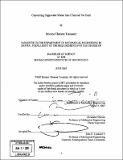| dc.contributor.advisor | Alexander Slocum. | en_US |
| dc.contributor.author | Toussaint, Etienne Clement | en_US |
| dc.contributor.other | Massachusetts Institute of Technology. Dept. of Mechanical Engineering. | en_US |
| dc.coverage.spatial | nwht | en_US |
| dc.date.accessioned | 2008-03-27T18:25:43Z | |
| dc.date.available | 2008-03-27T18:25:43Z | |
| dc.date.copyright | 2007 | en_US |
| dc.date.issued | 2007 | en_US |
| dc.identifier.uri | http://hdl.handle.net/1721.1/40940 | |
| dc.description | Thesis (S.B.)--Massachusetts Institute of Technology, Dept. of Mechanical Engineering, 2007. | en_US |
| dc.description | Includes bibliographical references (leaves 46-47). | en_US |
| dc.description.abstract | In Haiti, most families have traditionally relied on wood and wood-derived charcoal as their primary fuel source for indoor cooking. This resource has proven to be unsustainable, however, as over 90% of the Haitian countryside has already been deforested and wood is now in low supply. As a poor country, importing fuel is not a viable option and thus, the ability to utilize renewable energy sources is critical. The work of the Edgerton Development Lab, under the guidance of Amy Smith, has developed a process utilizing an oil drum kiln to convert readily available agricultural waste from sugarcane, known as bagasse, into clean burning charcoal briquettes. In order to improve the efficiency of the existing oil drum kiln, this research will explore the design of a brick kiln that is relevant for the social dynamic of developing countries, inexpensive to manufacture and simple to operate. By defining the best system applicable to the Haitian context, this research will enable the efficient production of charcoal. This research will also define the shape of the chamber and the steps involved in the conversion process, enabling Haitians to make use of their natural resources to address a critical energy need. In addition, the enhanced energy efficiency will reduce the production time of the charcoal briquettes. Lastly, this research will explore how this technology can be best integrated into the existing culture and lifestyle of the Haitian community and propose a strategy for community participation. | en_US |
| dc.description.statementofresponsibility | by Etienne Clement Toussaint. | en_US |
| dc.format.extent | 47 leaves | en_US |
| dc.language.iso | eng | en_US |
| dc.publisher | Massachusetts Institute of Technology | en_US |
| dc.rights | M.I.T. theses are protected by
copyright. They may be viewed from this source for any purpose, but
reproduction or distribution in any format is prohibited without written
permission. See provided URL for inquiries about permission. | en_US |
| dc.rights.uri | http://dspace.mit.edu/handle/1721.1/7582 | en_US |
| dc.subject | Mechanical Engineering. | en_US |
| dc.title | Converting sugarcane waste into charcoal for Haiti | en_US |
| dc.type | Thesis | en_US |
| dc.description.degree | S.B. | en_US |
| dc.contributor.department | Massachusetts Institute of Technology. Department of Mechanical Engineering | |
| dc.identifier.oclc | 212409940 | en_US |
